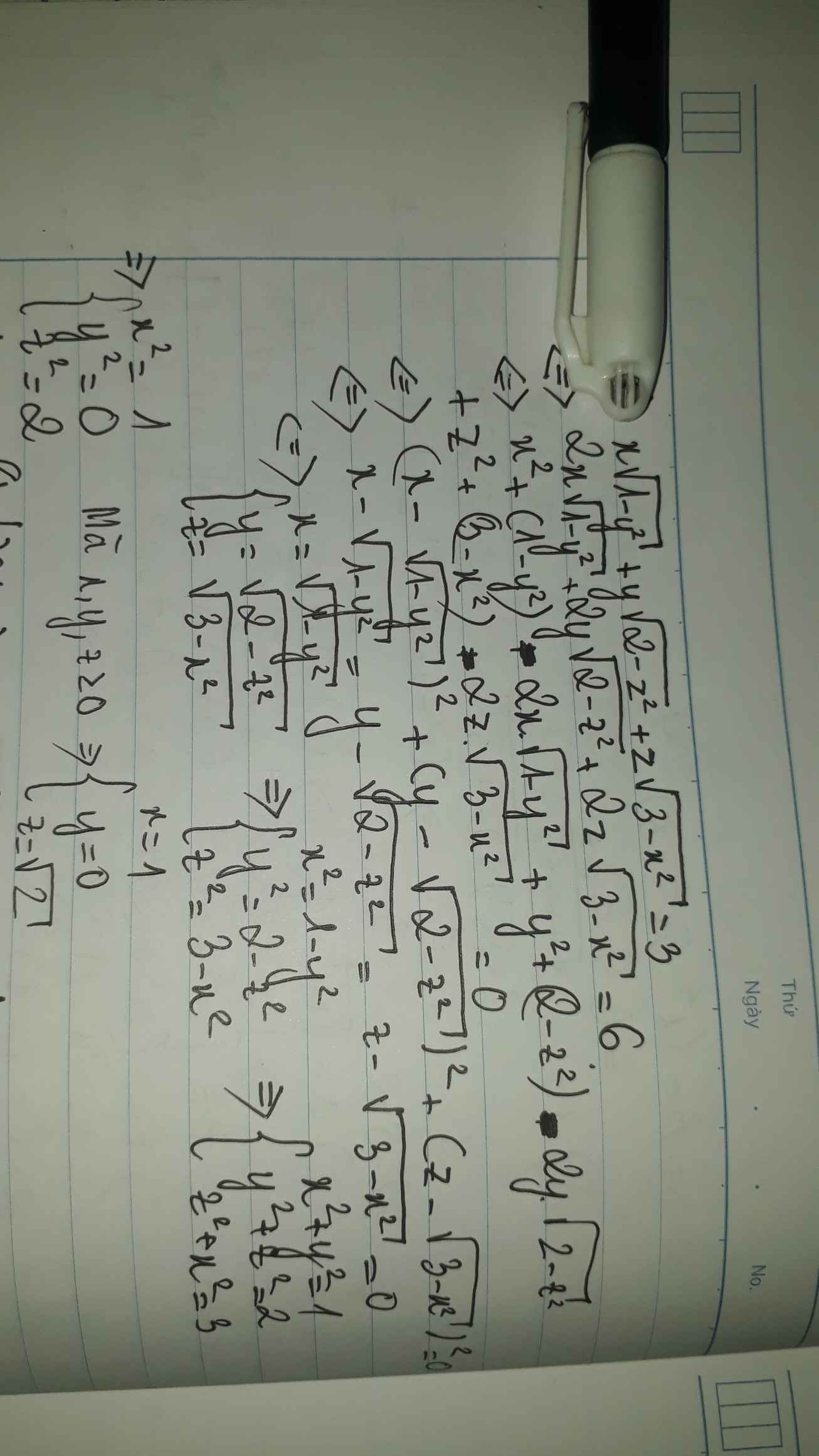Hãy nhập câu hỏi của bạn vào đây, nếu là tài khoản VIP, bạn sẽ được ưu tiên trả lời.

Áp dụng BĐT Cô-si, ta có :
\(P=\frac{1}{\sqrt{x}}+\frac{1}{\sqrt{y}}+\frac{1}{\sqrt{z}}\ge3\sqrt[3]{\frac{1}{\sqrt{xyz}}}\)
Mặt khác, ta có : \(\sqrt[3]{xyz}\le\frac{x+y+z}{3}=1\)
\(\Rightarrow P\ge3\)
Vậy GTNN của P là 3 khi x = y = z = 1
Cách đơn giản hơn cách của anh Tùng:) sửa nốt là thực dương :V
Áp dụng bất đẳng thức Cauchy-Schwarz dạng Engel ta có :
\(P=\frac{1}{\sqrt{x}}+\frac{1}{\sqrt{y}}+\frac{1}{\sqrt{z}}\ge\frac{\left(1+1+1\right)^2}{\sqrt{x}+\sqrt{y}+\sqrt{z}}=\frac{9}{\sqrt{x}+\sqrt{y}+\sqrt{z}}\)
Xét bđt phụ \(x+y+z\ge\sqrt{x}+\sqrt{y}+\sqrt{z}\)với x,y,z > 0 ( cấy ni thì dễ rồi nhân 2 vào cả 2 vế chuyển vế là xong )
\(\Rightarrow P\ge\frac{9}{\sqrt{x}+\sqrt{y}+\sqrt{z}}\ge\frac{9}{x+y+z}=\frac{9}{3}=3\)
Dấu "=" xảy ra <=> x=y=z=1

\(\frac{\sqrt{x^2+1}+\sqrt{y^2+1}+\sqrt{z^2+1}}{\sqrt{x+y+z}}\)

\(x\sqrt{1-y^2}+y\sqrt{2-z^2}+z\sqrt{3-x^2}=3\)
\(\Leftrightarrow2x\sqrt{1-y^2}+2y\sqrt{2-z^2}+2z\sqrt{3-x^2}=6\)
\(\Leftrightarrow6-2x\sqrt{1-y^2}-2y\sqrt{2-z^2}-2z\sqrt{3-x^2}=0\)
\(\Leftrightarrow\left(x^2-2x\sqrt{1-y^2}+\left(1-y^2\right)\right)+\left(y^2-2y\sqrt{2-z^2}+\left(2-z^2\right)\right)+\left(z^2-2z\sqrt{3-x^2}+\left(3-x^2\right)\right)=0\)
\(\Leftrightarrow\left(x-\sqrt{1-y^2}\right)^2+\left(y-\sqrt{2-z^2}\right)^2+\left(z-\sqrt{3-x^2}\right)^2=0\)
\(\Leftrightarrow x=\sqrt{1-y^2};y=\sqrt{2-z^2};z=\sqrt{3-x^2}\)
\(\Leftrightarrow x=1,y=0,z=\sqrt{2}\)



Bài 1: \(T=\sqrt{\frac{x^3}{x^3+8y^3}}+\sqrt{\frac{4y^3}{y^3+\left(x+y\right)^3}}\)
\(=\frac{x^2}{\sqrt{x\left(x^3+8y^3\right)}}+\frac{2y^2}{\sqrt{y\left[y^3+\left(x+y\right)^3\right]}}\)
\(=\frac{x^2}{\sqrt{\left(x^2+2xy\right)\left(x^2-2xy+4y^2\right)}}+\frac{2y^2}{\sqrt{\left(xy+2y^2\right)\left(x^2+xy+y^2\right)}}\)
\(\ge\frac{2x^2}{2x^2+4y^2}+\frac{4y^2}{2y^2+\left(x+y\right)^2}\ge\frac{2x^2}{2x^2+4y^2}+\frac{4y^2}{2x^2+4y^2}=1\)
\(\Rightarrow T\ge1\)
Bài 2:
[Toán 10] Bất đẳng thức | Page 5 | HOCMAI Forum - Cộng đồng học sinh Việt Nam
